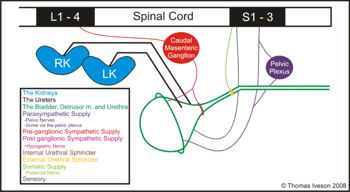|
 A schematic overview of the lower urinary tract showing the nerves and muscles involved in micturition Micturition is the normal process of the passive storage and active voiding of urine.
After entering the renal pelvis the modification of the urine is over in all domestic species other than the horse where mucin is added. The urine passes along the ureters and enters the bladder. It is here that the urine is stored until it is to be voided. Urine is not constantly excreted and it is only when there is a significant amount present in the bladder that the process of voiding occurs. Both the Bladder and the Urethra have smooth muscle and thus receive autonomic influence with regard to their activity. However the urethra also has an element of skeletal muscle giving the animal some degree of conscious control over the voiding of urine.
Sensory Innervation
The bladder has stretch receptors (alpha receptors in the neck and trigone, and beta receptors in the body) which detect fullness of the bladder. These impulse to the pelvic nerves and so to the sacral spinal cord. The urethra has afferents detecting flow, distension and pain that go via the pudendal nerve to the sacral cord.
Central Intregration
The co-ordination of the urethralis and detrusor muscles from information recieved from the stretch receptors occurs in the pons. This micturition centre also branches to the thalamus, cerebellum and cerebral cortex. It is the cerebral cortex that is responsible for voluntary control of micturition.
Click here to read more
|